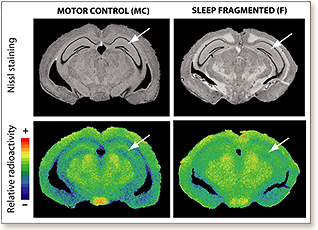 Sleep is viewed as a fundamental restorative function of the brain, but its specific role in neural energy budget remains poorly understood. Sleep deprivation dampens brain energy metabolism and impairs cognitive functions. Intriguingly, sleep fragmentation, despite normal total sleep duration, has a similar cognitive impact, and in this paper we ask the question of whether it may also impair brain energy metabolism. To this end, we used a recently developed mouse model of 2 weeks of sleep fragmentation and measured 2-deoxy-glucose uptake and glycogen, glucose and lactate concentration in different brain regions. In order to homogenize mice behaviour during metabolic measurements, we exposed them to a novel environment for 1 h. Using an intra-hippocampal electrode, we first showed that hippocampal electroencephalograph (EEG) response to exploration was unaltered by 1 or 14 days of sleep fragmentation. However, after 14 days, sleep fragmented mice exhibited a lower uptake of 2-deoxy-glucose in cortex and hippocampus and lower cortical lactate levels than control mice. Our results suggest that long-term sleep fragmentation impaired brain metabolism to a similar extent as total sleep deprivation without affecting the neuronal responsiveness of hippocampus to a novel environment.
Sleep is viewed as a fundamental restorative function of the brain, but its specific role in neural energy budget remains poorly understood. Sleep deprivation dampens brain energy metabolism and impairs cognitive functions. Intriguingly, sleep fragmentation, despite normal total sleep duration, has a similar cognitive impact, and in this paper we ask the question of whether it may also impair brain energy metabolism. To this end, we used a recently developed mouse model of 2 weeks of sleep fragmentation and measured 2-deoxy-glucose uptake and glycogen, glucose and lactate concentration in different brain regions. In order to homogenize mice behaviour during metabolic measurements, we exposed them to a novel environment for 1 h. Using an intra-hippocampal electrode, we first showed that hippocampal electroencephalograph (EEG) response to exploration was unaltered by 1 or 14 days of sleep fragmentation. However, after 14 days, sleep fragmented mice exhibited a lower uptake of 2-deoxy-glucose in cortex and hippocampus and lower cortical lactate levels than control mice. Our results suggest that long-term sleep fragmentation impaired brain metabolism to a similar extent as total sleep deprivation without affecting the neuronal responsiveness of hippocampus to a novel environment.